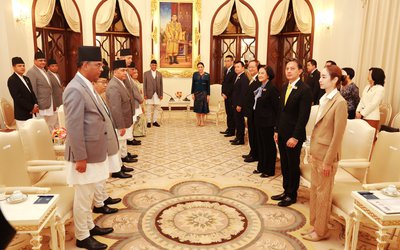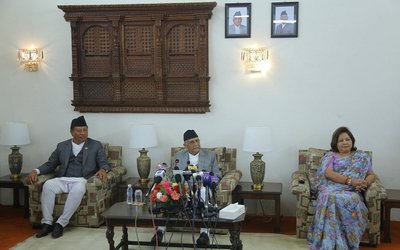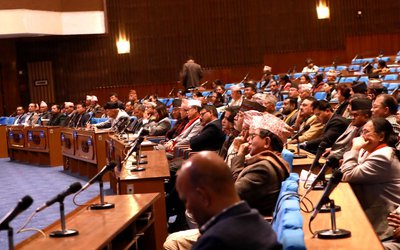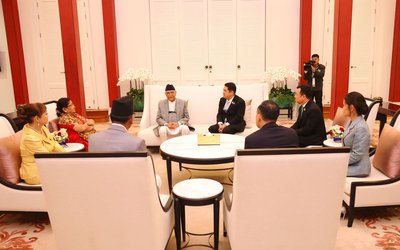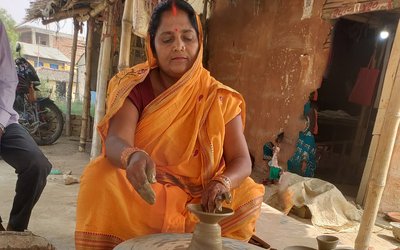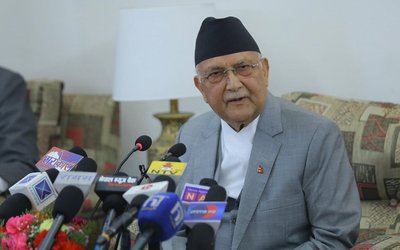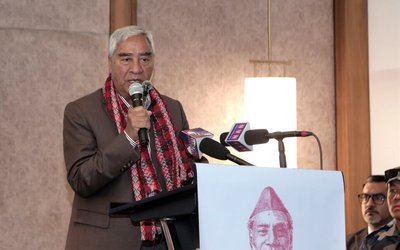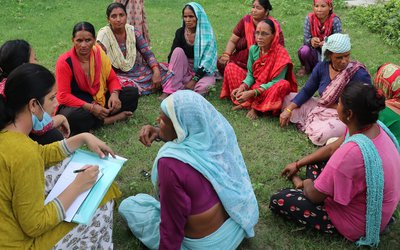
India Embassy and B.P. Koirala India-Nepal Foundation organized 23rd edition of Voices on Thursday, February 19, 2015 at Nepal Bharat Library in Nepal Airlines Building, New Road. The eminent playwright and director of India, Mahesh Dattani shared about his Life in Theater in this edition of Voices.
Dattani is a well acclaimed playwright from India, whose plays such as Where There’s a Will, Final Solutions, Dance like a Man, Bravely Fought the Queen, On a Muggy Night in Mumbai, Tara and Thirty Days in September have received critical accolades. He is also the first playwright in English in India to receive the coveted Sahitya Akademi award.
He has also directed two films – Mango Shuffle and Morning Raga.
“I was only 12 when I found myself connected to theater,” he began his story and added, “Back then I was not sure that I would be passionately into theater. As a young boy from a fair to do middle class family, my parents like many others of the time were certainly not keen of me picking of theater as my profession. I was studying History, Political Science and Economy for my graduation in Bangalore. We had a family business. And back them for people in business community, a graduation was mandatory not for academic merits but for the status they would acquire as a graduate businessman.”
He added humorously, “When once I was an audience to one of the plays being staged, I was absolutely fascinated to see how a play could keep shut some 600 Gujratis in the audience. Everything was loud and artificial in that act on the stage, but for some reason, everything was so real to me.”
In reminiscences of the theatrical scene in India of that time, he unveiled, “Bangalore Little Theater was a very popular hub back then for all who loved theater. However, this was more like a British Club to entertain the British who lived there then. The actors and the plays used to be British and the Indians were used for the backstage. Like any other person who loves theater, I also wished to become a theater actor. I was rejected many times in the auditions, so I rather started focusing on the production of the play. The more I got into it, the more I wetted my appetite to do theater.”
Furthermore, Dattani highlighted how he realized that the European plays he was producing was not emotionally engaging the audience as much as the plays in Hindi or on India was doing. He shared, “There was no spontaneous applause by the audience, no emotional engagement and that powerful expressions evoked on the faces of the audience with my plays like there was for plays in Hindi or about India. I therefore decided to try producing some Indian plays. And yes, it worked.”
According to a press release of Indian Embassy, other than working as a playwright Dattani also tried his hands in direction and has been acclaimed for his works in Morning Raga.
Pointing out difference between a theater and a cinema, he said, “Both theater and cinema are powerful mediums of expression. The difference between them is the language of cinema is embedded in everyone across the world. Thus every theater audience have watched cinema. However, not every cinema goer has been an audience to theater. No matter how amazing set you create for a play, it will still lack the vividness and graphics of that of cinema. One really has to understand theater to enjoy it. The language of theater is words and once you are on the stage, you are not a life there, you are an art. These besides, a cinema is a process and a theater is a product. There is no transitory to a play once performed.”
Dattani is currently in Kathmandu to stage his play Thirty Days in September, which is directed by Anup Baral, presented by B.P. Koirala India-Nepal Foundation and is being screened at The Theater Village in Uttar Dhoka, Lazimpat, until February 25, 2014.
The event concluded with an interaction between Dattani and the audience.
Abhay Kumar, Secretary of B.P. Koirala India-Nepal Foundation presented token of appreciation to Dattani at the end of the event.
- IME GROUP: Expands Into Paper Industry
- Mar 24, 2025
- CPN UML: Instigated By India
- Mar 23, 2025
- ADB’S CHIEF ECONOMIST: Nepal Reduces Poverty
- Mar 11, 2025
- FM DR. DEUBA: A Successful Visit
- Mar 11, 2025
- MD GHISING: Target Of Personal Grudge
- Mar 09, 2025

